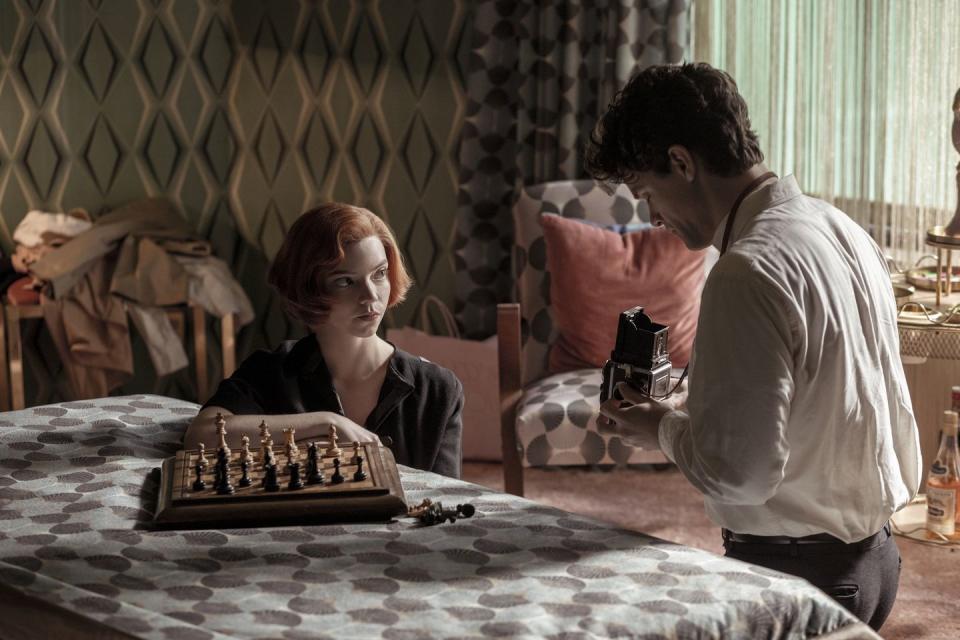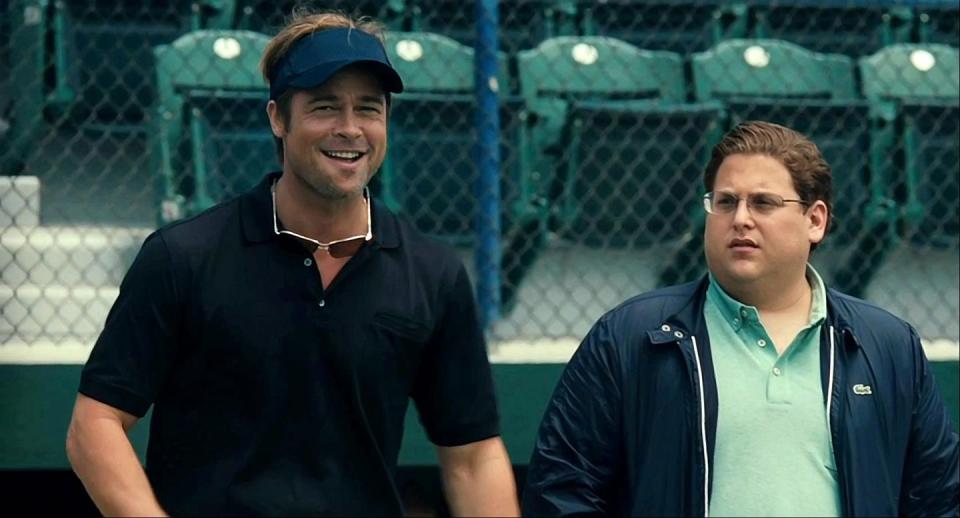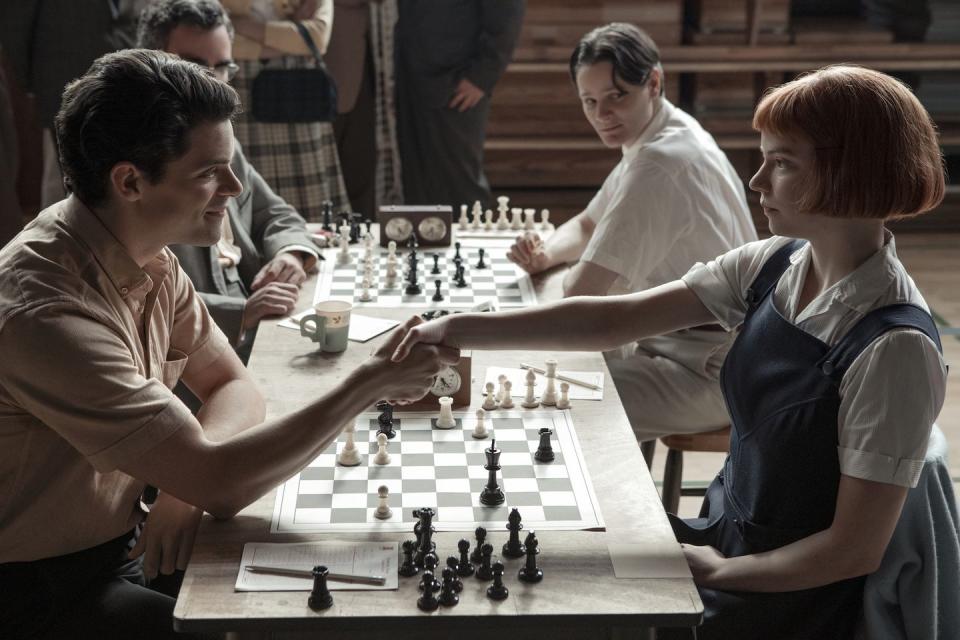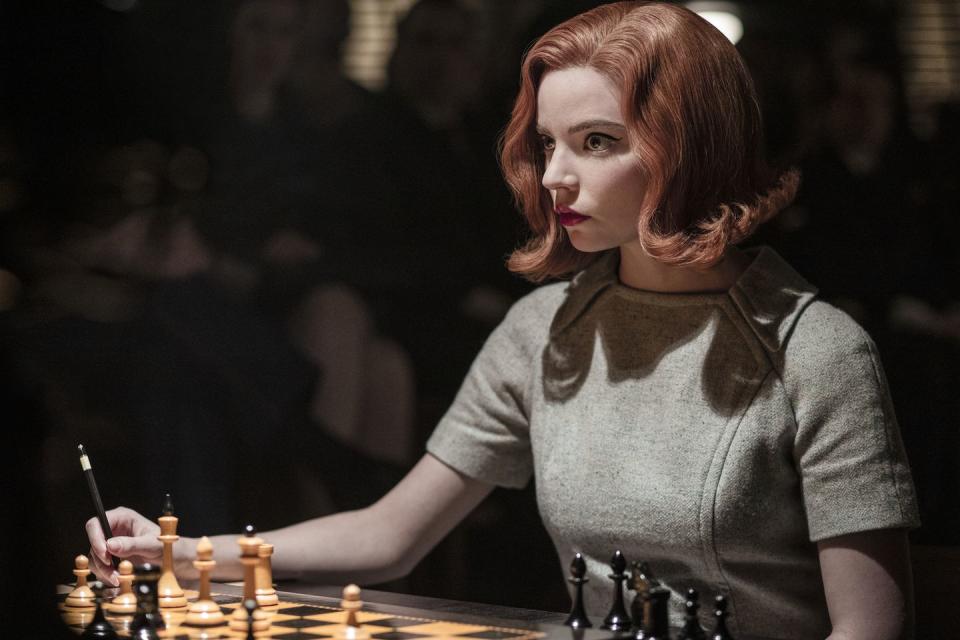Why ‘The Queen’s Gambit’ Is the Best Sports Show Ever
YOU MAY have been hearing buzz over the last month or so about a certain Netflix Original Chess Show. We have also heard that buzz. We have also participated in that buzz. And now we are going to further drive that buzz, simply by stating a truth: The Queen's Gambit is the best sports show of all time. (And granted that it's a limited series—there very likely won't be a season 2—you could make a case that it's actually a sports movie, and it would be among the best of all time in that genre, too.)
In case you've been living under a rock, a quick bit of recap: The Queen's Gambit is a 7-part Netflix limited series telling the story of Beth Harmon (played wonderfully by one of the industry's brightest up-and-coming stars, Anya Taylor-Joy) as she rises from a humble childhood in an orphanage and wrestles with a lifelong addiction problem to eventually get to the top of the food chain in the bigger-than-you'd-ever-expect world of chess. There are other shows similar to The Queen's Gambit, some sports-adjacent, and some not. (The show it feels most like is Mad Men, which is about an advertising agency in the '60s.) But the sheer quality of Gambit is rivaled by few if any.
Beth is an orphan—we get little morsels of information throughout the series abut what happened to her parents—but we, the viewers, are her family, in a way; along for the ride through thick and thin. We're with her as she makes friends with the orphanage's custodian (the excellent Bill Camp) who teaches her how to play chess. We're with her as she gets an adaptive mother (Marielle Heller), a few rivals-turned-friends (Harry Melling and Thomas Brodie-Sangster), and even a flirty friend (Jacob Fortune-Lloyd).

This premise combines with a few other things to make The Queen's Gambit the perfect sports television cocktail. First, it's just a compelling story—it could be chess, it could be ice hockey, or it could be a hot dog eating contest; if you have written a story that's drawing people in, with characters they want to root for (or, in some cases, root against), it's going to work. It also helps that Gambit has the perfect person at its helm.
Writer/Director Scott Frank (who previously worked on Netflix's Western limited series Godless) not only fills the series with gorgeous, innovative shots that make its perfectly recreated 1960s setting look like somewhere we'd want to at least spend a weekend (there could be a whole separate discourse on the various hotels), but the show is paced perfectly. There are a lot of shows where time seems to crawl; you'll check the Netflix bar and see 35 minutes left. Check again, 33 minutes left. Time's going slow. That never happens in Gambit, because it's got storytellers who know the most important things about telling stories.
Another thing about most "sports movies" as they're generally imagined is...you know the story. You know what's going to happen. There's an underdog, there's some adversity, and our underdog winds up winning. That's why for a story to stick out in this ever-so-crowded field, it's not only important to have a tight and streamlined narrative, but even more important to have characters we care about and relationships between those characters that we want to see explored.

In that realm, then, is where we see The Queen's Gambit shine, and it's where other sports movies/shows that also focus on less popular sports—or underserved areas within more popular sports—shine. One example of a sports movie that worked exceptionally is 2011's Moneyball, which was based on Michael Lewis' nonfiction book of the same name and told the story of Billy Beane's recreation of Major League Baseball's Oakland Athletics with advanced statistics and data known as sabermetrics.
We've seen many baseball movies before, and let's face it—they aren't all Field of Dreams. In Moneyball, the baseball is present throughout but the sport itself almost fades into the background; what viewers really wind up rooting for is Brad Pitt's eminently likeable turn as Beane, and his wonderful on-screen relationship with his daughter (played by Ray Donovan's Kerris Dorsey). Jonah Hill's Academy Award-nominated turn as Peter Brand (a slightly fictionalized version of Beane's real-life lieutenant, Paul Depodesta) is icing on the cake in the form of one more three-dimensional character for us to root for.

Its these unique spins on sport—a genre that also includes Steven Soderbergh's High Flying Bird and The Safdie Brothers' Uncut Gems—we get a look at the games and competition we love, but with dramatized takes on the parts that we don't see over and over again on TV. In 2014 a football movie called When The Game Stands Tall came out. I never saw this movie, but I did see its 2 minute, 40 second trailer multiple times in theaters, featuring just about every cliche in the book: a long winning streak snaps, a team seemingly falls into depression, a player in an inner city locale is murdered, the coach has a heart attack (???), and a sappy inspirational rock song plays. The movie landed only 20% fresh reviews on Rotten Tomatoes, and its easy to see why. We don't need to see this. No one needs to see this. Sports movies and shows are at their best when they're doing unique things, and exploring unique spaces.
Perhaps Gambit's biggest competition in the TV show field would be Friday Night Lights, the high school football series that ran for five brilliant seasons (OK, four, but it's better for everyone to make like the show itself and just ignore Season 2) between 2007 and 2011. While yes, FNL is excellent at almost every level—compelling story, strong writing, and dynamic character performances—it's a tougher nut to crack, in that it requires a somewhat understanding of football and the culture that can surround it in certain settings. I can tell my mom to watch The Queen's Gambit, and we'll be on a completely level playing field; very few of us know anything about chess other than what the show chooses to tell us. (If you want to learn more about the actual Queen's Gambit chess move, we've got you covered here at MH.)

This may come back to the overarching point—the best shows and movies in the sports genre aren't really about the sport they're centered on. Yes, its a draw to those of us who are fans of the sport in real life, but the reason we like The Queen's Gambit is because we like Tayl0r-Joy as Beth. The reason we like Moneyball is because we like Brad Pitt as Billy. We like Uncut Gems because we've never before seen Adam Sandler play such an unreliable ass hole. In the best sports movies sports provide the backdrop, but characters provide the quality.
With so many shows out in the world, too, (and more coming out every single week) accessibility is also an important consideration. Friday Night Lights is great, but 76 episodes is a commitment; at just 7 hour-long episodes, The Queen's Gambit tells its story in the same length as 2 or 3 movies. An easier sell to someone who may not be sure what—or how much—sports content they want in their lives.
That's not to say shorter is always better. Friday Night Lights gets a luxury in those 76 episodes: the ability to build characters with layers and experiences that they can share with the viewers, and by the conclusion of the series, those are shared experiences. That's a good thing; but it's something that Gambit, which was designed for the purpose of telling its entire story in seven episodes, knows to work around. Every experience is shared, every story implied but understood. We know what we need to know, we see what we need to see, and we hear what we need to hear.

And by the end of the series, it only takes a couple hours for us to feel a real connection with these characters, and have a real interest in chess that most of the audience almost certainly never expected to have. We feel for Beth Harmon. We raise our eyebrow at Benny Watts, and we cringe a little bit at Harry Boltik (his teeth, heavens to Betsy). We know these characters after just a few hours.
Next time you're watching a sports movie or show, whether it's by choice or just flipping through the channels, take a minute to think about it in the same lens that we're now thinking about The Queen's Gambit. Yes, we know the underdog is eventually going to beat the odds and top the favorite. It will be inspirational, confetti, hugs, et cetera. But what are the characters doing along the way? Are we getting anything from it? Because that's what Gambit knows best—it's not about the end result (though we love to see Beth beat Borgov), but about the road there. We saw what Beth had to do to eventually beat him. We saw who she had to meet, where she had to go, and what she had to learn about herself.
And that's more than you can say about the typical story that starts with a loss, and ends with a trophy being hoisted.
You Might Also Like

